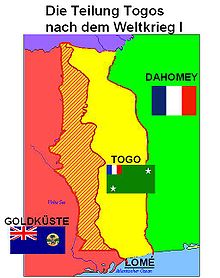British Togoland
British Togoland | |||||||||
|---|---|---|---|---|---|---|---|---|---|
| 1916-1956 | |||||||||
|
Flag | |||||||||
| Anthem: God Save The Queen | |||||||||
| Status | Mandate of the United Kingdom | ||||||||
| Capital | Ho | ||||||||
| Common languages | English | ||||||||
| Historical era | World War I | ||||||||
| August 27, 1914 | |||||||||
• Togoland partitioned | December 27, 1916 1916 | ||||||||
| July 20, 1922 | |||||||||
• Integration with Gold Coast | December 13, 1956 1956 | ||||||||
• Independence as Ghana | March 6, 1957 | ||||||||
| |||||||||

British Togoland was a League of Nations Class B mandate in Africa, formed by the splitting of German protectorate Togoland into French Togoland and British Togoland. Its capital was Ho.
The territory of British Togoland was first formed after a partition of Togoland on December 27 1916, during World War I. British and French forces already occupied Togoland. After the war, on July 20 1922, the League of Nations gave its mandate to formally transfer control of British Togoland to the United Kingdom.
After World War II, the mandate became a UN trust territory administered by the United Kingdom. During the mandate and trusteeship periods, British Togoland was administered as part of the adjoining territory of the Gold Coast, under the name of Trans-Volta Togo (TVT). [1]
In 1954, the British government informed the UN that it would be unable to administer the Trust Territory after Ghanaian independence. In response, in December 1955, the UN General Assembly passed a resolution advising the British government to hold a plebiscite on the future of British Togoland. On May 9 1956, this election was held under UN supervision, and 58% of registered voters opted for formal integration into an independent Gold Coast. [2] On December 13 1956, this unification was put into effect, creating a single entity that became the new independent nation of Ghana on March 6 of the following year.

